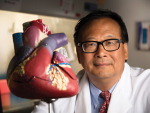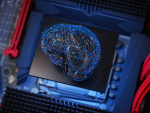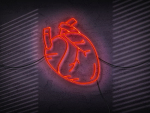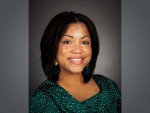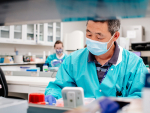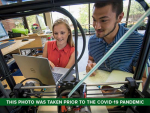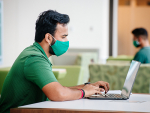Displaying items by tag: school of engineering
Hodge, who is graduating with a materials engineering degree, says the BMEN Peer Mentoring Program helped mold him “into a more complete individual.”
Tagged under
Topics include induced pluripotent stem cell technologies, nanotechnologies, nanomedicine, advanced biomanufacturing, 3D culture systems, 3D organoid systems, genetic approaches to cardiovascular tissue engineering and organs-on-a-chip.
The fields of neuroengineering and brain-computer interfaces could have a tremendous impact on a number of neurologic conditions, such as stroke, neurodegenerative disorders, Parkinson’s disease, dementia and other brain diseases.
Tagged under
The support surface invented by two UAB undergraduate engineering students will help change how nurses and patient care teams can provide care for patients in the hospital.
Tagged under
Online programs across numerous UAB schools and departments continue to excel year after year, according to U.S. News rankings.
Tagged under
Tagged under
The Master of Science in Instructional Design and Development program prepares students to effectively design, develop and evaluate learning in a variety of environments, such as health care, business, government and higher education.
Tagged under
Research outcomes from a newly funded study could aid in the development of novel therapeutic strategies for Alzheimer’s.
Tagged under
Research in animal models shows better formation of the fistulas, which are a lifeline for kidney failure patients as the connection site to dialysis machines.
Tagged under
Tagged under
Basic and translational research in this field aims to repair heart injury and prevent the heart failure that often follows a heart attack.
Collective strength of the research enterprise leads to almost $849 million in research grants and awards for FY 2021.
Tagged under
- release
- harbert institute for innovation and entrepreneurship
- school of public health
- school of medicine
- collat school of business
- college of arts and sciences
- school of dentistry
- school of education
- school of engineering
- school of health professions
- school of nursing
- school of optometry
- administration
UAB students will have the opportunity to further develop their career paths through specialized guaranteed internships.
Tagged under
Preclinical experiments show how to identify non-responding tumors and improve their response to immunotherapy, using two investigational new drugs that are permitted for human use. Physicians could immediately start investigational research in patients to test the effectiveness of this personalized approach.
Tagged under
The Gulf Scholars Program prepares undergraduate students to address environmental, health, energy and infrastructure challenges in the Gulf of Mexico region.
Tagged under
Tagged under
Release of TT-10 from nanoparticles improved heart function after a heart attack, accompanied by increased cardiomyocyte proliferation and smaller infarct size.
UAB’s newest academic building, located in the heart of campus, will serve College of Arts and Sciences faculty, staff and students.
Tagged under
In response to increasing case numbers and hospitalizations and in consultation with UAB infectious disease and public health experts, UAB is canceling large indoor events to protect the health and safety of students, faculty, staff and the community.
Tagged under
- release
- commencement
- office of the provost for student and faculty success
- school of nursing
- school of engineering
- college of arts and sciences
- school of education
- collat school of business
- school of optometry
- school of dentistry
- school of medicine
- student affairs
- graduate school
- honors college
- school of public health
- school of health professions
- commencement 2021
Fouad Fouad, Ph.D., laid the groundwork to ensure future success for the department through engineering education, research and community engagement. As he reflects on the rest of his career, Fouad says he is excited for the future of his field.
Tagged under

